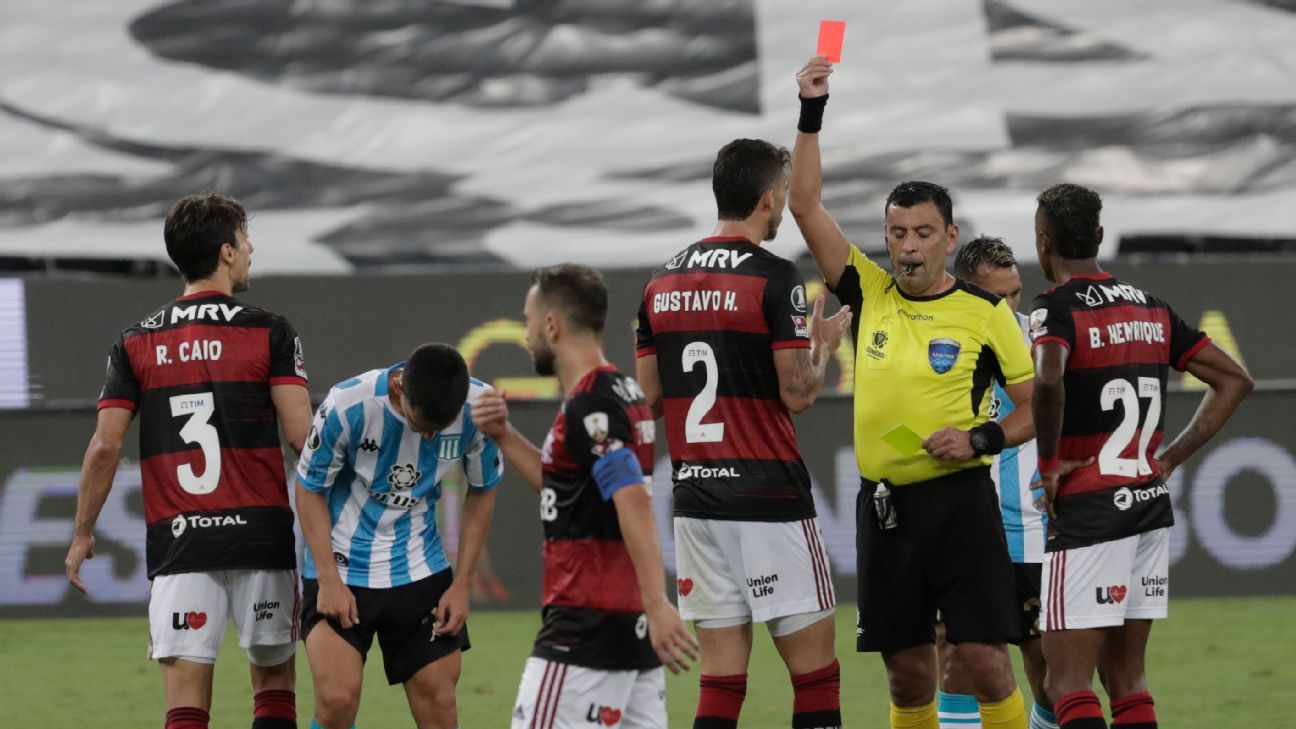Not since the start of the century has anyone managed to retain the title of the Copa Libertadores, and it is not going to happen this season. Flamengo of Brazil, the defending champions, failed to make the quarterfinals, falling in the first knockout round to Racing of Argentina on Tuesday.
After a 1-1 draw away from home in last week’s first leg, Flamengo were firm favourites to progress. They enjoyed most of the play and had some clear chances, but they fell behind in the second half, and appeared to be on the way out until midfielder Willian Arao equalised with a header in stoppage time, forcing a penalty shootout.
But, just a few moments after being the hero, Arao became the villain. He was the only player to miss from the spot, following an uncertain run up with a poorly aimed shot, comfortably saved by the outstanding Racing keeper Gabriel Arias.
– Vickery: Mourning Diego, Argentina turns to Boca’s Copa quest
Flamengo’s disappointment is all the greater because the final, scheduled for Jan. 30, will take place in their home stadium Rio de Janeiro’s giant Maracana.
And so Boca Juniors, who did it in 2000 and 2001, remain the last team to have won the Copa Libertadores title in consecutive years. There is an easy explanation for this striking lack of continuity: South American football has become an export industry. There is a price to be paid for success as the best players are placed in the shop window. In the case of Flamengo, they lost the player who underpinned their magnificent run in 2019, when they gave weekly exhibitions on the way to winning both the domestic and continental titles.
Spanish centre-back Pablo Mari was snapped up by Arsenal at the start of the year. In his quiet and unglamorous way, he held the team together. Portuguese coach Jorge Jesus wanted to play with a high defensive line — an uncommon strategy in Brazil, where the majority of domestic centre-backs are happiest defending close to their own goal, and profoundly uncomfortable running the risks of a high line. Signed in the middle of 2019, Mari instantly solved the problem, organising the defence and permitting the team to stay compact in the opposition’s half, so that the quick passing movements could flow.
Since Mari packed his bags, Flamengo have not come close to replacing him. The defence has been a problem all year; while Jorge Jesus was still at the club, when he returned home and was replaced by former Pep Guardiola assistant Domenec Torrent, and now under Rogerio Ceni.
This elimination was a clear consequence of the centre-back problem. A week ago, the defence was rocking and Flamengo were a little fortunate to get away with a 1-1 draw. At home in the return game, the Brazilians were by far the better side — that is until one centre-back was sent off and the other immediately made an error that cost his side a goal.
Mari’s partner from last year, Rodrigo Caio, was rushed back into action for the second leg after an injury lay off — understandably enough, because he is by some distance the best centre-back they have. But his timing in the tackle was off. In the first half he picked up a yellow card for a badly mistimed challenge and, just after the hour mark, he lunged into another contest and saw red. From the free kick the somewhat clumsy Gustavo Henrique — not a successful signing for Flamengo so far — ended up teeing up the ball for rival defender Leonardo Sigali to squeeze home.
New coach Ceni also does not come out of the occasion looking good. Under his reign, the club have been turfed out of the domestic cup, taken very seriously in Brazil, as well as the Libertadores — a poor start which perhaps serves the club right for its premature sacking of Torrent.
It would, of course, be foolish to place too much blame at the door of a coach who has just arrived, but his substitutions were questionable — not so much in terms of who he introduced as in who he withdrew. Flamengo have a pair of creative midfielders, current Brazil international Everton Ribeiro and Uruguayan cap Giorgian De Arrascaeta. The latter was sacrificed when Caio was sent off, and the former gave way to centre-forward Pedro. There is little doubt that Pedro was needed — the game in the last 20 minutes took place deep in the Racing half, even though the Argentines had the extra man. But this meant there was little space on the field for the speedsters, Vitinho and Bruno Henrique. The capacity of Everton Ribeiro and De Arrascaeta to create from nothing was badly missed.
Last year the Maracana was at its most exuberant, with a party spirit in the stadium as the team gave its weekly exhibitions, and that mood was carried to Lima, Peru, where Flamengo staged a dramatic comeback to overcome Argentina’s River Plate. On Tuesday night, the giant ground was a more melancholy sight, with no fans present and Racing’s triumph greeted by the shouts of their players echoing round the empty concrete.
